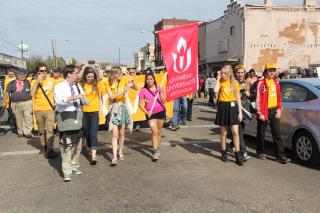Exposing Truths of the Murder of Rev. James Reeb
By Bart Frost
This post is best read listening to Sam Cooke’s timeless anthem celebrating the arc of justice that leading to freedom and justice for us all: A Change Is Gonna Come by Sam Cooke.* So turn-up the volume on your stereo (or phone or computer) and listen along as we chat about some heroes of the struggle for civil rights…
*please think to purchase the single or album from a reputable site :)
NPR has just released a new Serial podcast about the murder of Rev. James Reeb during the Selma campaign of the Civil Rights movement. Rev. Reeb, from Boston, was one of three people murdered during the campaign, the other two being Jimmie Lee Jackson and Viola Liuzzo.
While Jackson, a local African American activist, was not a Unitarian Universalist, both Rev. Reeb and Ms Liuzzo could be considered our first Unitarian Universalist martyrs. Rev. Reeb was a minister working with low-income and marginalized folks in Boston; Viola Liuzzo who is known as a “Detroit housewife” was an activist who didn’t hesitate to put her beliefs into action Both felt called to Selma because of their Unitarian Universalist faith.
As you listen to the first episode, which sets the stage for the rest of the series, I encourage you to take advantage of the many resources the UUA has compiled about these events. I especially encourage folks to look into the murder of Viola Liuzzo and its aftermath, which included FBI Director James Edgar Hoover besmirching her name and reputation.
We also invite you to ponder these questions through journaling, art, meditation, or discussion with a friend:
What was your initial reaction to the story? What made you sorrowful? What made you angry? Did you laugh or experience other emotions?
What did you already know about this story? What did you learn?
Reflecting on Ms. Joanne Bland’s story about the department store, when have you generalized your experience as the experience everyone had? When was a time that you realized that your experience was very different than that of the others around you?
In his interview, Rev. Orloff Miller speaks about standing in front of Walker’s Cafe alone, alluding to its quiet beauty and how it could be any Midwest town like the town in Ohio where he grew up. Many Northern towns have a history of being sundown towns. What is the history of your community?
As you reflect on these personal questions, I also encourage you to look into the hidden, unspoken history of your town and church. What stories do we tell and what stories remain hidden?
Some UU churches have identified that money from the Transatlantic Slave Trade built their buildings; others have discovered that the reason there are two congregations in town is because of a split due to involvement in the Civil Rights movement (or not); others have trap doors from when the congregation used to hide folks from slave hunters. Some of our congregations formed during the Civil Rights movement. What’s the story of your church? What other stories can be uncovered in your community?
How can our actions now and living our Principles, help us navigate painful history while building toward the future? What can we learn from our past?
There is more to learn:
